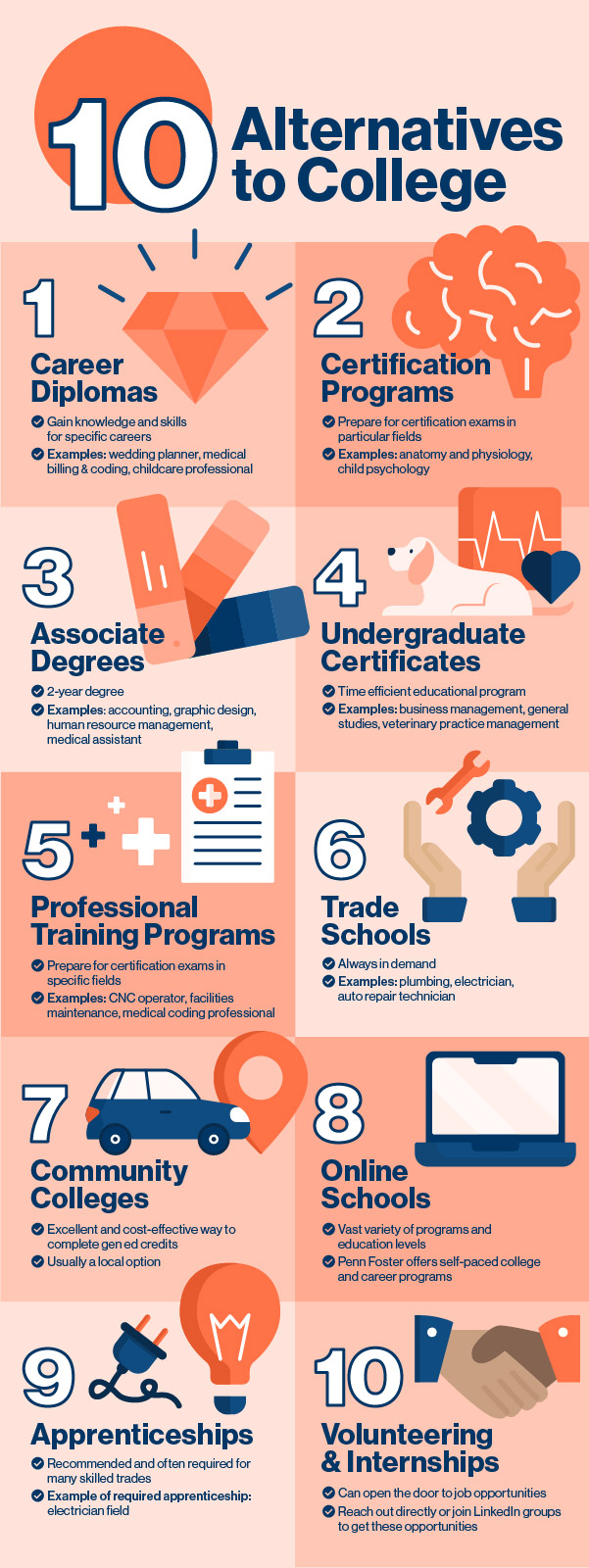
10 Alternatives to College (Guide)
Oct 01, 2024
8 min read
It can often feel like college is the natural next step after high school. The reality, however, is that college is not the only option after high school. College also can mean different things to different people. If you don’t know what you want to do with your life, or if you do and the end goal does not require a four-year degree, there are many alternatives to college you can opt for that can prepare you for success! Learn about some of these alternatives and discover what option may be right for you!

1. Career diplomas
Career diplomas are awarded after completing educational programs geared towards specific careers. Since career diploma programs are often career or industry specific, there are usually no general education courses to complete. If you know what career you want and it doesn’t require a degree, a career diploma could be for you!
There are many career diploma programs available, including:
- Wedding planner career diploma
- Medical billing and coding career diploma
- Childcare professional career diploma
Penn Foster medical billing and coding graduate Rachel Delgado opted for a career program after initially going to work in a medical office after high school. That’s what led her to the online medical billing and coding program.
"Nobody expects an 18-year-old right out of high school to go straight to college to know what they want to do in life,” she says. “It's okay to work for a bit and then find something and fall in love with it and then go to school for it."
Read more: Jobs in Healthcare Management & Healthcare Administration: Your Career Guide
2. Certification programs
Some jobs may require certification, so enrolling in a certification program can be a great next step after high school! Certificate programs are educational programs that prepare you for specific certifications within a field. Some certification programs even cover the cost of the certification exams, making this option worth your while. Certifications can be incredibly useful for careers in the medical field or even the trades field.
When applying for jobs, especially in the medical field, having a certification under your belt can set you apart. In fact, 83% of employers in healthcare would hire a candidate with nationally recognized certification over a candidate without certification. It can be just as beneficial in the trades field as well, according to Penn Foster skilled trades instructor Bob Shafer.
“More and more in the trades industry, you're going to see some kind of certification being needed for employment, whether it's ASE-type certifications or electrical ones.”
Read more: 10 Medical Certifications That Pay Well
3. Associate degrees
Associate degrees are still college degrees, but unlike a bachelor’s degree they can be completed in just 2 years. If time is of the essence, an associate degree could be the perfect educational solution for you. Many jobs may require you to have a degree, any degree, so an associate degree can look great on your resume. These degrees can also be a more affordable option over 4-year degrees.
A few examples of associate degree programs include:
Penn Foster Veterinary Technician graduate Nicole Gonzalez shares her experience getting her associate degree: “I would be lying if I said that during the program I didn’t have moments where I thought, okay is this worth it? Should I do it? But in the end, it was a personal thing for me. I think that if you stick your mind to it enough and you kind of have that personal goal to achieve this, it's going to be worth it. I personally feel like having gone through the program, it’s definitely built my self-confidence...I know how to do my job, I can help others, I can train, I can confidently explain to somebody or a client what may be wrong with their pet or what the doctor may suggest.”
Read more: What Jobs Can You Get With an Associate Degree?
4. Undergraduate certificates
An undergraduate certificate program focuses on a specific area to help you gain knowledge and skills, or get some college credits under your belt. You may find an undergraduate certificate program more affordable and time-efficient than a degree program if you know exactly what you want to do. Completing an undergraduate certificate program can be a great addition to a resume and help you stand out when applying for jobs. You may be surprised to learn that the number of certificates awarded has grown since the pandemic.
Some great undergraduate certificate programs to help boost your resume include:
Read more: Do I Need to Go to College to Get a Good Job?
5. Professional training programs
If you want to enhance or gain specific skills and knowledge, a professional training program may be the way to go. Professional training programs may be a single course or a series of industry focused courses. Many of these programs can prepare you for certification once completed as well, and some programs may even cover the cost of your certification exam. You’ll develop practical skills if you opt for a professional training program, especially since many are hands-on.
Some professional training programs include:
Read more: Becoming a Facilities Maintenance Technician (Guide)
6. Trade schools
An excellent alternative to college is enrolling in a trade school. There are many options in the world of trades and they are often in demand. Some examples are:
Vocational programs have actually seen a spike in recent years, making trades a popular alternative to college.
Penn Foster offers many skilled trades programs, some of which can even prepare you for certification!
David Pennington, a small engine repair graduate, shares how a trades program benefitted him: "I've always been highly interested in engines and taking stuff apart, putting it together. This just gave me the detail of it, per se, like how it works on the inside."
Read more: Is Becoming a Diesel Mechanic a Good Career?
7. Community colleges
Community college is a great option for those who don’t know what they want to do but know they want higher education. It’s a great way to get your general education courses out of the way without spending the money per credit you might at a four-year college. What’s great about attending community college is you can use those credits as your sole form of higher education or you can transfer to a four-year college later and send in your transcript so you don’t have to start from scratch.
8. Online schools
When the pandemic hit in 2020, every student was forced to continue their education online. Quarantine lasted longer than anyone could have predicted. This allowed many students the time to adequately compare in person learning to online learning. The result was enrollment in online school rising with many students finding they learn better this way. Online schools like Penn Foster offer a plethora of programs, including associate degrees, bachelor degrees, and career training programs. Programs like this are self-paced, making it a great option for students who need flexibility, convenience, and the ability to study on the go.
Rachel Delgado shares her experience with online school: "Even though I was skeptical of going to school online because I was homeschooled, I went to an online high school and it worked and I loved it. And so going to an online college was even better."
Read more: 15 Tips for Online Learning (Your Guide to Taking Online Classes)
9. Apprenticeships
An apprenticeship is a formal, work-based learning program that blends practical, on-the-job experience with classroom education. If you're considering a career in the skilled trades, an apprenticeship is often recommended and may even be required to enter the field. Through hands-on training, an apprenticeship ensures that you gain the necessary skills to perform the job effectively. One of the greatest advantages is that apprenticeships often provide a paycheck, allowing you to earn while you learn.
10. Volunteering and internships
Gaining experience through volunteering and internships can be incredibly valuable. Internships often pave the way to full-time positions and are sometimes paid, offering a direct path into the workforce. While volunteering doesn’t come with a paycheck, it provides an excellent opportunity to learn the ins and outs of a particular field and can be highly rewarding. For example, if you’re interested in working in a vet’s office, volunteering at a local animal shelter can be beneficial.
There are several ways to find internships or volunteer opportunities. Networking plays a crucial role, so attending industry events and joining professional groups on platforms like LinkedIn can open doors to potential internships. Tailoring your resume for specific opportunities and reaching out directly to organizations can also be effective strategies. These experiences can serve as practical alternatives to college, leading to real-world job opportunities.
Open the door to opportunity
With all these alternatives to college, it’s clear a four-year degree is not the only road to success. Everyone has a right to education, but that doesn’t mean education looks the same for everyone. Whether you opt for traditional college, a career program, or other online options, obtaining more education can positively impact not only your life but also your finances. Check out the full list of programs offered by Penn Foster and make the decision that’s right for you!



